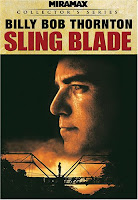
So recently I've been interested in films by first time directors. Especially ones that have done pretty well at Sundance by first-time directors. If I hadn't expressed it before I believe directing a good film is one of the most difficult things to do in the world (right up there with hitting a Major League home run) so, much props to those people that have done it.
The first thing that struck me about this movie was how well Billy Bob Thornton understood the world he was creating, and especially understood the characters within it. We were being led by an expert. We jump straight into the heart of the movie with the story told by the murderer in the mental hospital, talking in detail about one of his kills. It's clear that the world we live in is a perilous, cruel one. Billy Bob's Karl character is a force of nature within the film-- a simpleton who acts by what he believes is right and just (definitely not the Hamlet type). As Karl gets released from the mental hospital and attempts to start his life anew, we are certain that he will once again face a decision where he must kill to maintain his sense of justice. Even though you kind of know where the film is going, it's how we get there that keeps the film genuine and real. What really drives the film is the cruelty of the antagonist, Doyle, in the film. He's like a lot of people we know - selfish, immature, moody, insensitive, and it seems that Thornton is saying that cruelty is the result of a deep-seated dissatisfaction with one's self. When Karl eventually hacks Doyle up, he does it without a struggle from him, and with a kind of acceptance. In real life, the bad guy kind of knows that they're the bad guy which is sad. I think the great thing about the film is that it's not trying to be big and cutting edge, but rather focuses on the small unexpected details of life. I think most young directors try to hit the scene big with a totally original concept but fail to really give it the attention to detail it needs to make it good. So many times I see that going small is the best way to go big.
No comments:
Post a Comment